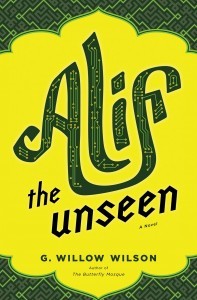 G. Willow Wilson's Alif the Unseen is fantastic--in all sense of the word. It combines so many things that I love: interesting characters, nuanced mythology, religion, a rapid-paced plot, and just a smidgen of romance.
G. Willow Wilson's Alif the Unseen is fantastic--in all sense of the word. It combines so many things that I love: interesting characters, nuanced mythology, religion, a rapid-paced plot, and just a smidgen of romance.Alif (not his real name) is a computer hacker who spends most of his life hiding behind his screen name, making money by protecting opponents of the state from discovery. He lives in a Middle Eastern world referred to vaguely as the City, and he's fallen in love with an aristocratic woman, Intisar, who jilts him for an arranged marriage with a powerful city prince. In obedience to her request that she never see him again, Alif sets out to create a computer code that will hide his online presence from her, regardless of where she goes in the net. But the resulting creation has unexpected consequences, when it draws the attention of the powerful Hand (the City's online police). At the same time, Intisar sends him an old, odd-smelling book for safe-keeping. When the City sends security to question Alif, he goes into hiding in real life (something he's not well adapted for). A series of leads brings him to seek protection from the oddly-named Vikram the Vampire, who may or may not be a jinn. As Alif seeks to untangle the mess he's made of his life--and of his innocent neighbor Dina, who's drawn into his flight--he begins to realize that the world is both bigger and more complicated than he had ever realized.
I know that not every reader will love this as much as I do. I loved the interplay of mythology (here, jinns, efrits, demons, and more) and ordinary life; but more than that, I loved the sensitive way that religion was approached, the way that Alif confronts the limits of his own faith, and the way that his evolving faith in the unseen (both in the unseen world of hackers and the unseen world of the jinn) ultimately becomes his strongest weapon. The language nerd in me loved the sort of post-modern interplay between the digital world of coding and the world of the jinn: the way Vikram tells Alif that "I believe that with the advent of what you call the digital age you have breached a kind of barrier between symbol and symbolized."
Another example of this kind of digital and religious interplay comes when Alif is trying to explain quantum computing to an elderly religious leader. The sheikh responds,
Let me rephrase what I think you have said in language from my own field of study: they say that each word in the Quran has seven thousand layers of meaning, each of which, though some might seem contrary or simply unfathomable to us, exist equally at all times without cosmological contradiction.And Alif, startled, realizes this is exactly what he meant. This kind of philosophizing might drive some readers away, but it's part of what I loved about the novel. It made me think, even as the plot pulled me through. I should add that there's some language here, for readers who are bothered by that sort of thing.
This is a book I've had on my reading list for a while. Glad to know it's as good as it looked!
ReplyDeleteI thought it was really clever. Some reviewers thought parts were boring, but I loved the metaphysical stuff.
Delete